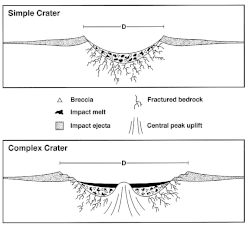| Dhala crater | |
|---|---|
 | |
| Impact crater/structure | |
| Confidence | Confirmed |
| Diameter | 3–11 kilometres (1.9–6.8 mi) |
| Age | 2.44 and 2.24 Ga |
| Country | India |
| State | Madhya Pradesh |
| District | Shivpuri district |
| Municipality | Bhonti village |
Dhala crater (N25°17'59.7" and E78°8'3.1") is a crater formed by an asteroid impact.[1] It is situated near Bhonti village in Pichhore block of Shivpuri district of Madhya Pradesh state in India.[2] It is the largest crater in India,[2] and between the Mediterranean and Southeast Asia. The diameter of the structure is estimated at 3 kilometres (1.9 mi),[3] while other sources estimate its diameter to be 11 km diameter. It is the second such crater found in India, after Lonar lake.[2]
It is 200 km east of the Ramgarh crater, the location of 11th century Bhand Deva Temple which was renovated by INTACH in 2018.
Impact date
It is estimated that the impact occurred between 2.44 and 2.24 Ga.[4] Basement rocks are predominantly composed of granitoids.
Largest in India
This crater on the Bundelkhand craton is the largest crater in India.[2][5]
See also
- Impact craters in India
- Lonar crater at Lonar in Buldhana district of Maharashtra
- Luna crater at Kutch district of Gujarat
- Ramgarh Crater in Mangrol tehsil of Baran district of Rajasthan
- Shiva crater, an undersea super crater west of India
- Other related topics
References
- ↑ "Dhala". Earth Impact Database. Planetary and Space Science Centre University of New Brunswick Fredericton. Retrieved 2016-04-26.
- 1 2 3 4 PTI (11 January 2009). "Indian geologist discovers oldest impact structure in India". Live Mint, News. Retrieved 26 July 2015.
- ↑ "Meteoritical Bulletin: Entry for Dhala". www.lpi.usra.edu. Retrieved 2020-01-24.
- ↑ Li, Shan-Shan; Keerthy, S; Santosh, M; Singh, S.P; Deering, C.D; Satyanarayanan, M; Praveen, M.N; Aneeshkumar, V; Indu, G.K; Anilkumar, Y; Sajinkumar, K.S (2018). "Anatomy of impactites and shocked zircon grains from Dhala reveals Paleoproterozoic meteorite impact in the Archean basement rocks of Central India". Gondwana Research. 54: 81–101. Bibcode:2018GondR..54...81L. doi:10.1016/j.gr.2017.10.006.
- ↑ Pati, J. K.; Reimold, W. U.; Koeberl, C.; Singh, H. K.; Pati, P. (2008). Dhala - A New, Complex, Paleoproterozoic Impact Structure in Central India (PDF). Large Meteorite Impacts and Planetary Evolution IV. Bibcode:2008LPICo1423.3041P.
Further reading
- Keerthy, S; Vishnu, CL; Li, SS; Reshma, N; Praveen, MN; Oommen, T; Singh, SP; Sajinkumar, KS (2019). "Reconstructing the dimension of Dhala Impact Crater, Central India,through integrated geographic information system and geological records". Planetary and Space Science. 177: 104691. Bibcode:2019P&SS..17704691K. doi:10.1016/j.pss.2019.07.006.
- Li, SS; Keerthy, SS; Santosh, M; Singh, SP; Deering, CD; Satyanarayanan, M; Praveen, MN; Aneeshkumar, V; Indu, GK; Anilkumar, Y; Sajinkumar, KS (2018). "Anatomy of impactites and shocked zircon grains from Dhala reveals Paleoproterozoic meteorite impact in the Archean basement rocks of Central India". Gondwana Research. 54: 81–101. Bibcode:2018GondR..54...81L. doi:10.1016/j.gr.2017.10.006.
- Pati, Jayanta K; Reimold, Wolf Uwe; Koeberl, Christian; Pati, Puniti (2008). "The Dhala structure, Bundelkhand craton, Central India-Eroded remnant of a large Paleoproterozoic impact structure". Meteoritics & Planetary Science. 43 (8): 1383–1398. Bibcode:2008M&PS...43.1383P. doi:10.1111/j.1945-5100.2008.tb00704.x.

